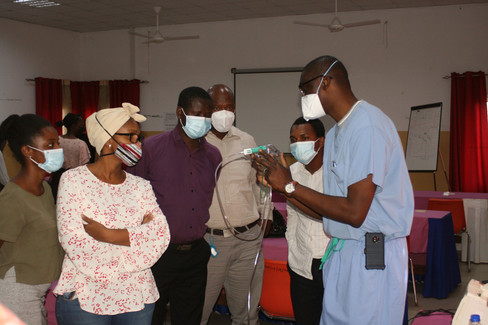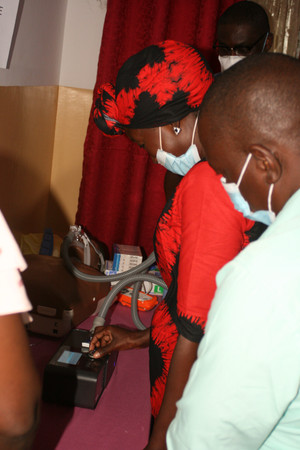Dr. Sunkaru Touray
- Benny Axt
- Jun 25, 2023
- 7 min read
Updated: Sep 7, 2023

My father is a physician and he exposed me to medicine from a young age. I grew up traveling across Nigeria because my father worked in different hospitals and so I had very early exposure to medicine. As Gambians, we would visit home, and spend time in Kartong, our village, and during those trips, my dad had me working as his assistant, applying bandages and moving boxes, very early on. Despite this early exposure, I initially resisted the idea of becoming a doctor because of how busy I saw my dad.
In high school, I rebelled. I did not want to do medicine, but I took a transformative gap year from 1998 - 1999 and reflected on what I wanted to do with my life, and my sense of purpose. During that year, I decided to become a doctor. I studied medicine in Ghana - an experience that was both enlightening and enjoyable. In the course of my study, I had an opportunity to do clinical rotations in the United States and I fell in love with the way that medicine is practiced in the US. It brought to life many things that I learned in medical school, and this experience inspired me to pursue post graduate specialization in the United States. To realize this dream, I identified mentors, including Dr. Jacob Plange-Rhule, former Rector of the Ghana College of Physicians and Surgeons, whose premature death from COVID in 2020 was a huge loss to Africa. I also forged a close relationship with Professor Sir Tumani Corrah KBE MRG. These two giants mentored me through the arduous journey of clinical training in Ghana to ultimately match into one of the top residency training programs in the United States.
Experiences working as a physician in Ghana stirred an interest in epidemiology. In my practice at the time, I saw many patients with conditions that were very advanced and incurable, and I wondered what was driving these conditions in the communities where these patients lived. I attended graduate school at the University of Basel in Switzerland through a generous grant from the atDta and Josef und Olga Tomcsik-Stiftung in Switzerland. At Basel, I worked with Professor Guéladio Cissé and Professor Jürg Utzinger - two professors who left an indelible mark on me. Through their research group, I studied the effect of climate change, climate variability and infectious disease epidemiology in Mauritania. This was my first real exposure to research and the work I did then would have a significant impact on what I am working on now with Permian Health.
After graduate school, I completed internship, residency, and clinical fellowship at the University of Massachusetts Medical School, specializing in Pulmonology and Critical Care Medicine. While training in Massachusetts, I reflected on my experience in Africa and wondered what accounted for the differences in health outcomes in the two places. I was fortunate to win a generous grant from Umass to conduct a study on critical care capacity in The Gambia. Our research at the time found that hospitals in Gambia lacked an integrated system of care and that only one public hospital in the country had a dedicated intensive care unit with eight beds, resulting in an estimated 0.4 ICU beds/100,000 population. It also dawned on me at the time that I was the first Gambian to train in critical care medicine. This realization led me to reflect on how I could help support the development of the specialty in the country.
Critical care is a relatively new specialty that is highly specialized, multidisciplinary, and dependent on technology that is lacking in Gambia. This realization informed my decision to forego promising academic career opportunities in favor of starting a pulmonary practice in Carlsbad, Eddy County New Mexico. I was the only pulmonologist in an area larger than Gambia. It was a daunting, but deliberate decision. I reasoned that if I am ever going to learn to build successful programs in Gambia in the future, I must first learn how to do it here in the US. In Carlsbad, I started what was at the time the only pulmonary practice, and it got busy very quickly. I learned how to run a practice, and developed an advanced bronchoscopy service, while serving on hospital committees, which I enjoyed. Everything was fine until the COVID-19 pandemic started. As the only critical care trained physician in the county at the time, I was asked to lead the Hospital’s COVID-19 task force. Working with hospital staff, we quickly developed and implemented treatment protocols, to care for patients who were sick with COVID. When a vaccine became available, I volunteered to be the first recipient of the vaccine in the county as a way of inspiring confidence among my colleagues, and in the community. I was not trying to be a hero, but I felt that leadership in a crisis requires setting the right example and it did convince others to follow suit to get vaccinated. In the same year, I would travel to The Gambia during the peak of the first wave to render my expertise in the care of critically ill patients with COVID at the National Treatment Center. This was a very challenging but very rewarding experience for me and it taught me many lessons about leadership, and crisis management.

I joined Sound Physicians in 2021. At the time, I was looking for a new start and Texas said “howdy” so I moved! Sound was starting a new ICU program at St. Luke’s Health in Lufkin, East Texas. I was the first intensivist that they hired for that program. I currently serve as Program Medical Director and ICU Director of a thriving program that is providing high value care for the communities of East Texas. This has been a great experience as I have learned how to adopt a Systems of Care approach to improve healthcare quality in resource-constrained settings. My experience in the US has taught me that America is a country of contradictions characterized by an abundance of wealth and resources that are unequally distributed, resulting in islands of poverty, and health constraints that are sometimes not too different to some parts of Africa.
What is the mission of Permian Health and how does it align with your personal values?
When I completed my training, I started going back to Gambia to provide clinical care and teaching on a voluntary basis. Through interactions with patients and doctors during these visits, I discovered that many Gambians are exposed to air pollutants and have poor lung health without knowing it. Even among individuals with breathing problems, most Gambians will never get to see a pulmonologist to have their health concerns addressed. Until a few years ago, there were no spirometers (an instrument used to measure lung function) in the country’s public health system, limiting the ability to diagnose patients with breathing problems. Through connections and partnerships in the US and in Africa, I was able to get spirometers and funding to sponsor the first workshop for doctors in Gambia. Now there are at least two spirometers in the public health system, which is a start, but is still inadequate.
I co-founded Permian Health with my wife Dr. Awa Sabally-Touray, MD to address these challenges through clinical care, advocacy, and research. We are actively engaged in lung health initiatives and awareness campaigns. In addition, we are very excited to launch two strategic initiatives in The Gambia: The Permian Health Clean Air Initiative and the Women’s Lung Health Initiative.
The Clean Air Initiative is a multidisciplinary effort that seeks to promote lung health locally by developing the capacity to measure air quality in The Gambia. We are collaborating with IQAir, a Swiss company to install an integrated network of low-cost outdoor air quality sensors, across The Gambia. These sensors will measure particulate matter (PM1, PM2.5) and share air pollution data openly with the public in a user-friendly format to empower citizens to understand their exposure. Air pollution is an under recognized cause of cardiovascular and respiratory disease. We believe that developing local capacity to detect air pollution, and connecting it to health is very important, which is why we chose this to be our first major strategic initiative.
The Women's Lung Health Initiative (WLHI) is a collaboration between the Permian Health Lung Institute and GAMCOTRAP, a Gambian grassroots women's rights organization established in 1984 in The Gambia. The WLHI will measure lung function and a biomarker called Nitric Oxide in Gambian women using highly sensitive equipment. Exhaled Nitric Oxide is a biomarker for a type of inflammation that allows for targeted treatment of certain types of lung diseases. We will employ a development and gender framework to identify knowledge gaps on clean air and formulate a social mobilization and advocacy plan to reach out to different target groups to raise their consciousness and awareness about air pollution and lung health.
By implementing these initiatives, we aim to tackle significant public health problems and raise awareness at the population level, laying the groundwork for the next phase of our mission at Permian Health. We are on a mission to bridge the technological divide through the transfer of technology and knowledge acquired around the world to improve health outcomes in Gambia.
In your eyes, who are 2-3 other Healthcare Heroes?
Gary works for the housekeeping service in my hospital in Texas. Gary’s work is what makes our ICU a healing space. Our work would be a lot harder, if not impossible, if not for people like him. I am of the view that Heroes in healthcare extend beyond doctors and nurses. They include the biomedical engineering department that services our equipment, ensuring for example, that when a patient is on a ventilator, the equipment works, or that a patient receiving an infusion gets the correct medication with precision and no errors. Our heroes are hospital engineers who ensure that water and oxygen flows and that the ventilation system works. Having trained and practiced in both developing and advanced countries around the world, I have a unique perspective about the importance of teamwork in modern medicine. Multidisciplinary healthcare professionals, who I rarely see, and whose names I may not know, are vital to our work, and this is demonstrative of the collaborative nature of modern medicine. I do not consider myself a hero. Rather, I see myself as one link in a chain of individuals working collaboratively to make the world a better place.







